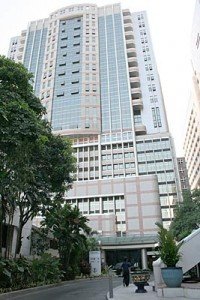BANGKOK – The Muslim world continues to react to Wednesday’s unexpected announcement by the Saudi-based Wahhabi Council declaring Bumrungrad International, a privately owned tertiary health-care center in Bangkok, Thailand, as Islam’s third holiest site.
In a rare live televised address broadcast on Al-Jezeera, Sheikh Mohammad Akbar-Abdullad stated to a worldwide audience of an estimated 1.5 billion followers of Islam the new order for holy sites.
“Following the Holiest of Holies, Makka (Mecca), birthplace of the Prophet, Peace Be Upon Him, and the caliphate capital of Medina, the third holiest site shall be Bumrungrad. God is Great,” read the text in part. No further explanation was given.
Reaction was swift and varied, but generally positive, according to most news agencies gauging informal reaction from the Muslim population at large.
“The Koran commands us to treat our bodies as the temples of god,” said Babu Farrak, a Moroccan hotel owner. “With its world-class health care, luxurious facilities, and five-star service, Bumrungrad is a natural pilgrimage site for all Muslims at least once in their lives. If they can afford it.”
Representatives of the Muslim religion were more mixed in their response. Sheik Mahmud al-Sumaidaei, a leading Sunni cleric in the Association of Muslim Scholars (AMS), welcomed the news as “evidence that Islam is a modern religion, with the welfare of its followers always in mind.” Whereas Ayatollah Ali Sistani, Iraq’s leading Shia cleric, was more skeptical, questioning whether the changes were part of a Wahhabi plot to continue to marginalize non-Sunnis.
“Thailand is not even a Muslim country,” he observed. “To place a holy site in the land of the apostate is blasphemous.”

However, he did admit that he had in fact made three pilgrimages himself to Bumrungrad, once in 1999 for a prostate exam and twice in 2003 with his entire extended family. “They do have a lovely prayer room,” he admitted. “And some of the staff spoke Arabic fluently.”
Also critical but for different reasons was the Jerusalem Muslim Tourism Board, which among other sites promotes religious vacations to the Dome of the Rock, site of Mohammed’s ascension and the previous third holiest site in Islam. Syed Nawab Haider Naqi, the board’s acting director, was “shocked and dismayed” that the Dome had been bumped to fourth by a site that was “less than 50 years old.”
As to whether it might hurt tourism, Naqi remained upbeat. “We think we can package some tours with the Dome of the Rock and Bumrungrad together,” he said. “Medical tourism is very popular now—especially among well-to-do Muslims.”
Not surprisingly, the happiest response came from Bumrungrad International itself. “We’re delighted and honored,” said Ruben Toral, Bumrungrad’s marketing director. “Bumrungrad takes pride in serving the world’s Muslims with the best health care and friendliest service. We had 430,000 foreign patients from over 150 countries come here last year.” Toral declined to give actual figures on what percentage of Bumrungrad’s visitors were Muslim, but acknowledged that global geopolitics had some effect. “Let’s just say not every country has its arms open to Muslims these days. But here in Thailand, you’ll always be treated like a guest.”
Even before the expected boom in visitations from the world’s Muslims, Bumrungrad International already resembles a pilgrimage site, with its corridors and lobby host to a constant stream of bearded men in serwals and tunics, and women in hajibs, abayas, jilbabs, niqabs, shalwars, and khamizes. Speculation has arisen that special prohibitions may be forthcoming prohibiting non-Muslims from entering the holy site itself. Already, many non-Muslim patients feel like outsiders at Bumrungrad.
“Who let in the f**king Arabs?” asked Dereck Linderman, an American tourist. “They better not put me in a room with one.”


